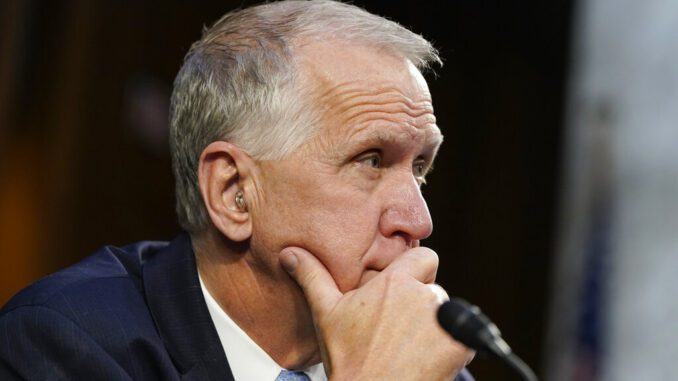
RALEIGH — North Carolina Republican Sen. Thom Tillis criticized Gov. Roy Cooper’s veto of Senate Bill 101 on Tuesday, saying the bill simply requires sheriffs in the state to cooperate with ICE when dangerous criminal illegal immigrants are detained for violent crimes.
While the immigration bill given final General Assembly approval last week removed some provisions from the 2019 measure, Cooper said the legislation was still unconstitutional and designed to supersede the ability of sheriffs to manage the safety of constituents, weakening law enforcement.
“Gov. Cooper has effectively declared North Carolina a sanctuary state. The veto of a common sense bill to stop sanctuary city policies allows his political allies to keep ignoring federal law enforcement and keep releasing dangerous and violent criminals back into communities across North Carolina where they will continue to commit violent crimes,” said Tillis. “The Biden-Harris administration’s weak border enforcement policies, combined with the soft-on-crime policies promoted by liberal leaders, are making our state and nation less safe.”
The Democratic governor vetoed a similar Republican measure in 2019, which came on the heels of newly elected sheriffs in several urban counties deciding against working closely with U.S. Immigration and Customs Enforcement agents who are seeking suspects they believe are in the country unlawfully.
The legislation “is only about scoring political points and using fear to divide North Carolinians,” Cooper said in his written veto message, adding that as the former attorney general, “I know that current law already allows the state to incarcerate and prosecute dangerous criminals regardless of immigration status.”
The legislature could attempt a veto override, as when lawmakers planned to reconvene briefly starting July 26.
The immigration bill would require sheriffs to check whether someone in their jails charged with felony drug or violent crimes is a legal U.S. resident. A sheriff may find out that ICE has issued a detainer, which says the agency wants to pick up someone they believe is in in the country unlawfully.
If a detainer is listed, deputies would have to take the inmate to a local magistrate or judge, who will decide whether to issue an order holding them. The additional hold would give ICE agents 48 hours to pick up the inmate.
Groups representing immigrants and the poor argued the change would make it less likely for immigrants to report crimes, leading to more dangerous communities. They also said voters elected these urban sheriffs because they campaigned on easing aggressive postures against immigrants.
The bill “was an effort to rally anti-immigrant sentiments ahead of the upcoming elections. We’re glad the governor did right by his immigrant constituents” and vetoed the measure, El Pueblo Executive Director Iliana Santillian said in a news release.
Tillis, according to his office, has introduced legislation aimed at stopping sanctuary city policies. The Immigration Detainer Enforcement Act legislation would clarify the Department of Homeland Security’s (DHS) detainer authority, clearly establish the authority of states and localities to maintain custody in cases in which a detainer has been issued, and incentivize cooperation between law enforcement agencies and DHS through the reimbursement of certain detention, technology, and litigation-related costs.
Tillis also introduced the Justice for Victims of Sanctuary Cities Act, legislation that holds sanctuary jurisdictions accountable for failing to comply with lawful detainer and release notification requests made by federal authorities and jeopardizing public safety.
The Associated Press contributed to this report.


